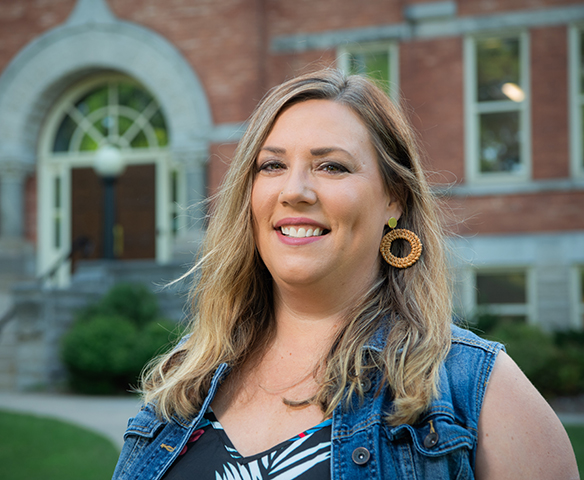



Before working in academia, Michelle Falter started her career as a high school English teacher in Waukesha, Wis., and taught English internationally in grades 6-12 in countries such as the Dominican Republic and Germany. Falter also worked to build a partnership with schools and teachers in rural Kitale, Kenya, providing professional development training to 300-plus educators there. From these experiences, she has developed a profound love of global learning and engagement.
Falter has a deep commitment to diversity and social justice, helping educators co-construct knowledge with their students using critical, feminist and dialogic teaching practices. At the heart of her work as a scholar and teacher is advocacy and allyship for – and with – all teachers and students. Her research interests include dialogic and critical pedagogies, English teacher education, young adult literature and emotion in the teaching of literature and writing in the secondary classroom.
Her research talks back to paradigms that neglect both teachers and students in the conversation, that attempt to dictate curriculum and pedagogy to mean one testable thing, and that expect English language arts to be the learning of discrete facts, devoid of emotion and passion or critical discussion of topics relevant to our students’ lives.
Select publications:
Eagle, J., Falter, M. M. & Donovan, C. M. (accepted, in press). #WriteTeachChat: Social media for writing to learn and learning to write. In A. Cicchino & T. Hicks (Eds.) Better Practices: Experts and Emerging Instructors Explore How to Better Teach Writing in Online and Hybrid Spaces. WAC Clearinghouse.
Falter, M. M. (2022). When the shoes don't fit: A critical empathy framework for (young adult) literature instruction. The ALAN Review, 50(1), 18-32.
Kerkhoff, S. N., & Falter, M. M. (2021). Going the distance: Using Flipgrid to mediate race discussions across two young adult literature courses. CITE (Contemporary Issues in Technology Education) Journal, 21(4).
Lee, C. C., Falter, M. M., & Schoonover, N. R. (2020). Encountering the affective in Latino immigrant youth narratives. Reading Research Quarterly, 56(2), 273– 292. DOI:10.1002/rrq.316
Falter, M. M., Alston, C. L., & Lee, C. C. (2020, July). Becoming anti-racist English teachers: Ways to actively move forward [White paper]. North Carolina State University. Retrieved from https://www.go.ncsu.edu/antiracist-ela
Falter, M. M., & Barnes, M. E. (2020). The importance of the “comfort zone” in preservice teachers’ evaluation of video-analysis sessions as a tool for enhanced reflection. Teacher Education Quarterly, 47(2), 64-85. Falter, M. M.., & Bickmore, S. (Eds.). (2018). When loss gets personal: Discussing death through literature in the secondary ELA classroom. Rowman and Littlefield.
Falter, M. M.., & Bickmore, S. (Eds.). (2018). Moving beyond personal loss to societal grieving: Discussing death's social impact through literature in the secondary ELA classroom. Rowman and Littlefield.
Fecho, B., Falter, M. M., & Hong, X. (Eds.). (2016). Teaching outside the box but inside the standards: Making room for dialogue. Teachers College Press.